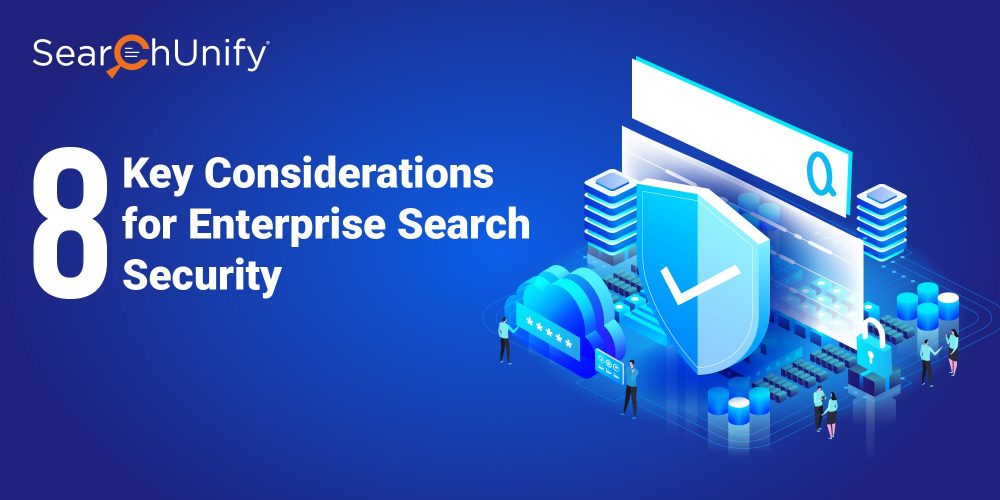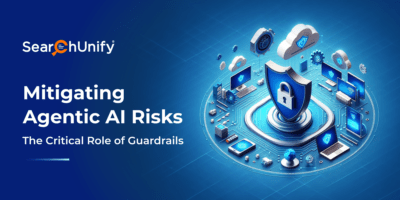
Research suggests that there are over 2,200 attacks each day which breaks down to nearly 1 cyberattack every 39 seconds.
This puts businesses in a vulnerable spot. One loose end and things could go south even before you know it.
When it comes to enterprise search, where the underlying principle is to make more information easily accessible, data security becomes quite the challenge. The bigger the index, the more the chances of sensitive information getting leaked. Here are 8 things you should consider for your enterprise search security and keeping cyber attackers at bay.
1. Controlling Access Levels
Organizations find themselves in a pickle for granting access permissions to users because some solutions aren’t very adaptable. A good enterprise search solution offers a flexible model that allows you to define ‘who can access what.’ For instance, John, the manager, is allowed to view, edit, and export ‘analytics’ and ‘search tuning’ but David, a new recruit, is only allowed to view both.
Additionally, it should allow admins to control data access based on document classes or versions, as well as, by IP whitelisting. This way by limiting access to a particular set of users, the search engine protects your data.
Did you know? At least 30,000 websites are hacked worldwide every day.
2. Encrypting Data in Transit & at Rest
Digital data can be broadly classified into two parts—data in transit; data at rest. As the names suggest, the former is when any form of enterprise data is traveling across networks or being processed and the latter is when it’s stored on a device or backup.
A reliable engine protects both these data forms using encryption. AES has become the industry standard with AES-256 being the most secure way to protect data. As an additional layer of security, the search solution should use multifactor authentication to ensure no unauthorized person accesses the information.
Did you know? Cybercrime will cost the world $8 trillion yearly in 2023.
3. Using Single-Tenant Solutions
Business leaders hold single-tenant solutions in high regard. With a multi-tenant solution, you’re always in danger of data bleed and threats arising out of vulnerabilities affecting other organizations.
Hence, you might want to consider a single-tenant search solution that guarantees the security of the content while maintaining indices and preventing any accidental information leakage. Another advantage of having dedicated search instances is that they store all the information in one place, making migration and export easier.
Did you know? Cybersecurity spending is estimated to exceed $188 billion in 2023.
4. Providing Secured Access to Authentication
In the corporate world, sharing passwords or releasing any kind of personal information is a cardinal sin, and rightly so. Having said that, your employees still need to access and share information residing on disparate data sources, applications, and APIs on various platforms.
This is when OAuth, an open-standard authorization framework, comes into the picture. Advanced, secure search solutions provide industry-standard OAuth 2.0 for authenticating access to different content source platforms. Users can share information with ease without multiple logins, all the while ensuring their credentials aren’t compromised.
Did you know? Web Arx Security opines that 300,000 thousand new pieces of malware are created daily.
5. Having An Incident Management Mechanism In Place
Attackers are always on the hunt for data gold mines, and you having no detection system in place only makes their job easier. That’s why a proactive search solution employs some form of intrusion detection and alert mechanism.
Now, it’s a given that it will keep tabs on your company’s search instance, informing you of any errors and malfunctions. But, it should also monitor the current health of content and search API to identify and report any security incidents.
Did you know? Net Scout suggests that 23,000 DDoS attacks occur on the internet every 24 hours.
6. Tying Loose Ends With VAPT Auditing
In the realm of data protection, it’s indispensable for organizations to identify weak links and decipher ways to address them. VAPT, short for Vulnerability Assessment and Penetration testing, helps determine and address possible cybersecurity risks in an infrastructure.
Therefore, you should go for a search provider that vigorously audits the product, both internally and externally, to ensure the integrity of your data.
Did you know? Cybint Solutions says that 64% of companies worldwide have experienced at least one form of cyber attack in the past year.
7. Having Business Continuity And Disaster Recovery Plan
Prevention is better than cure. But if you do get infected, you will need a cure. The same goes for your business. That’s why companies have disaster recovery programs as part of their business continuity plan and your search solution should be no exception.
Modern enterprise search platforms are well aware of this and good ones maintain backups across multiple systems to help protect against accidental destruction or loss. Just having the recovery plan in place is not enough, the search provider should regularly test it successfully and efficiently.
Did you know? Forbes says the cost of crypto crimes could rise to $30 billion by 2025.
8. Having Business Continuity And Disaster Recovery Plan
Implementing real-time security monitoring and intrusion detection systems is crucial for safeguarding your system. These measures continuously monitor network traffic, server logs, user activity, and application behavior to identify any suspicious activities or attempts to compromise your system. By analyzing data and using both signature-based and behavior-based analysis, these systems can detect anomalies and potential security breaches.
When a security threat or intrusion is detected, alerts or notifications are generated to notify administrators or security personnel. This allows for prompt investigation and response, enabling you to take immediate action to mitigate the threat and block unauthorized access. By proactively identifying and responding to security incidents, these systems help protect your system, data, and users from potential harm.
Overall, the implementation provides a proactive approach to security, allowing you to identify and respond to threats in a timely manner. By doing so, you can minimize the impact of security breaches and ensure the integrity of your system and data.
Did you know that there were 22 billion breached records in 2021?
Apart from all the above security considerations, an enterprise search solution should be compliant with legal and regulatory requirements. Some of the highest standards for business process control, data security, and privacy emphasize being compliant with ISO 27001, ISO 27701, HIPAA, SSAE 18 SOC 1, SOC 2 Type II, SOC 3 attestation reports. Some forward-thinking enterprise search platforms are GDPR, CCPA, and PIMS (BS 10012) compliant.
Need help with deciding on the right search engine for your enterprise? Here’s a guide for you!
Zeroing in on the right search solution for your enterprise can be a daunting task. Here’s a comprehensive guide that will make it a breeze to evaluate solution capabilities & save you a lot of time.



















